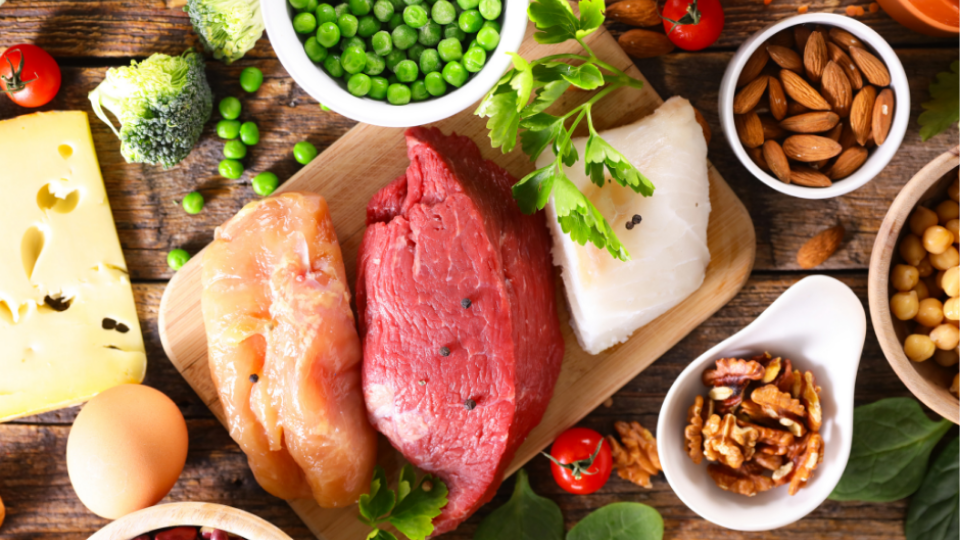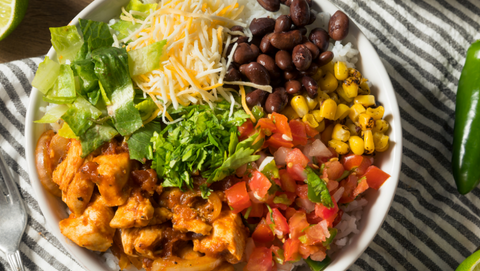Optimizing Protein: A Guide for Endurance Runners

Over the last decade, protein has become a hot topic in the world of fitness and sports nutrition. Commonly recognized for its positive impact on building lean body mass, protein has become a highly sought after dietary component, especially when it comes to resistance training. Adequate protein intake is also essential among endurance runners. This article will introduce protein, explore its impact on endurance performance, identify current recommendations for protein intake, and cover protein-rich meal and snack ideas.
What is Protein?
Located in the skin, hair, muscle, bones, and almost every other part of our bodies, protein is responsible for many essential activities including building and repairing tissues, providing structure, maintaining blood pH, and assisting with fluid balance. Proteins can also act as antibodies, hormones, and enzymes to support normal bodily functions.
Protein is a macronutrient and is found in many of the foods we eat. Protein is composed of amino acids, which are the building blocks of protein. Our bodies use amino acids to maintain good health and complete many bodily functions. There are 20 different amino acids that our bodies need to function. Of those, 11 are non-essential, meaning our bodies can make them. The other nine are essential amino acids, meaning they cannot be made by the body and must be obtained through the food we eat.
In order for our bodies to work properly, we have to eat enough protein. Dietary protein is found in animal-based products (meat, fish, eggs, and dairy) and plant foods (legumes, whole grains, nuts, seeds, and some fruits and vegetables). Animal-based products offer complete proteins, meaning they contain all nine of the essential amino acids. On the other hand, plant foods typically offer incomplete proteins, meaning they lack one or more of the 9 essential amino acids. For those who choose not to eat animal products on a regular basis, complete proteins can be made by eating a variety of plant foods each day.
Protein and Endurance Performance

Although endurance exercise is primarily fueled by the energy provided from carbohydrates and fats, protein still plays important roles in promoting optimal endurance performance.
Adequate protein intake is essential in preserving a runner’s lean body mass. Due to the high physical load of endurance exercise on the body, a runner’s muscle tissue regularly undergoes breakdown. If a runner does not eat enough protein to support muscle repair on a consistent basis, muscle mass will decrease, which could affect endurance performance.
Likewise, research has shown that protein can provide up to 10% of energy during prolonged exercise, mostly from protein composed of branched-chain amino acids (BCAAs). Put simply, BCAAs are a group of 3 essential amino acids: leucine, isoleucine, and valine. These amino acids create a branch-like chemical structure – earning the nickname “BCAAs”. While many runners choose to supplement BCAAs, this grouping of amino acids is also found in many protein-rich foods and can be consumed in adequate amounts by eating enough protein.
Finally, when paired with carbohydrates, protein can assist in replenishing muscle glycogen stores, easing body soreness, promoting muscle repair, and speeding up recovery after endurance exercise. Ultimately, this allows runners to return to exercise as quickly as possible, feeling and performing their best.
Protein Recommendation for Endurance Runners
To compensate for the high physical load of prolonged and intense exercise, endurance runners have increased protein needs – though it may not be as much as you think. Currently, it is recommended that endurance runners eat 1.2 to 1.4 grams (g) of protein per kilogram (kg) of body weight each day. Protein should be eaten periodically throughout the day since the body can only use about 15 to 30 grams of protein in one sitting before turning any excess protein into glucose or fat for storage. It is also important to note that endurance runners must eat enough carbohydrates and total calories to allow their bodies to use protein for muscle repair and other essential bodily functions rather than breaking it down for energy.
Endurance runners can also benefit from planning their protein intake according to their exercise schedules. Table 1 shows how this can be accomplished. It is recommended that runners try these protein timing strategies in training and adjust them to meet their needs. In doing so, runners can enhance their endurance performance while also optimizing recovery periods.
Table 1. Protein recommendations for endurance runners based on exercise phase
|
Before Exercise |
During Exercise |
After Exercise |
|---|---|---|
|
Eating high amounts of protein prior to running can cause gut distress during exercise.
If your pre-exercise meal is 1 to 2 hours before exercise, focus on eating mostly carbohydrate-rich foods. You do not have to completely cut out protein – just strive to eat less than you typically would.
If your pre-exercise meal falls 3 to 4 hours before exercise, you do not have to worry about limiting your protein intake – just strive to eat lean sources of protein along with enough carbohydrates. |
Protein intake during exercise is not necessary but may enhance performance for those participating in prolonged exercise (4+ hours).
If you choose to try this, the recommendation is to consume 0.25 g protein/kg body weight/hour of exercise in combination with carbohydrates. |
A runner’s initial recovery meal should contain 15 to 30 g of high-quality protein containing all of the essential amino acids (lean meat, poultry, seafood, eggs, quinoa, etc.).
For optimal recovery, runners should pair carbohydrates with protein in their post-exercise meals. The recommendation for this strategy is a 3:1 ratio of grams of carbohydrates to grams of protein. |
Protein-Rich Meal and Snack Ideas

The best way for runners to meet their protein needs is by incorporating protein into all meals and snacks (with the exception of the pre-exercise meal if it is eaten within an hour or two of exercise). Here are a few delicious protein-rich meal and snack ideas to help you get started:
Breakfast:
- Breakfast sandwich
- Overnight oats (toppings can include berries, nut butters, seeds, etc.)
- Omelet and toast
- Vegetarian option: Oatmeal bowl (toppings can include berries, nut butters, seeds, etc.)
Lunch:
- Taco salad
- Greek chicken gyros
- Tuna salad sandwich
- Vegetarian option: Mediterranean quinoa salad
Dinner:
- Chicken burrito bowl
- Salmon, asparagus, and a baked potato
- Spaghetti and meatballs
- Vegetarian option: Vegetable bean stir-fry
Snack:
- Greek yogurt parfait
- Beef/Turkey jerky and nuts
- Protein balls
- Vegetarian option: Black beans hummus and seeded crackers
References
- Harvard T.H. Chan School of Public Health (2023). Protein. https://www.hsph.harvard.edu/nutritionsource/what-should-you-eat/protein/
- Karpinski, C., & Rosenbloom, C. A. (Eds.). (2017). Rosenbloom CA. Sports nutrition: A Handbook for Professionals. (6th ed.). Academy of Nutrition and Dietetics.
- MedlinePlus (2021, March 26). What are proteins and what do they do? https://medlineplus.gov/genetics/understanding/howgeneswork/protein/
- Moore, D. R., Camera, D. M., Areta, J. L., & Hawley, J. A. (2014). Beyond muscle hypertrophy: why dietary protein is important for endurance athletes. Applied physiology, nutrition, and metabolism, 39(9), 987–997.https://doi.org/10.1139/apnm-2013-0591
- Saunders, M. J., Luden, N. D., DeWitt, C. R., Gross, M. C., & Dillon Rios, A. (2018). Protein Supplementation During or Following a Marathon Run Influences Post-Exercise Recovery. Nutrients, 10(3), 333. https://doi.org/10.3390/nu10030333
- Schoenfeld, B. J., & Aragon, A. A. (2018). How much protein can the body use in a single meal for muscle-building? Implications for daily protein distribution. Journal of the International Society of Sports Nutrition, 15, 10. https://doi.org/10.1186/s12970-018-0215-1
- Stuart, A. (2022, November 18). Branched-Chain Amino Acids. https://www.webmd.com/vitamins-and-supplements/branched-chain-amino-acids-uses-risks
- Thomas, D. T., Erdman, K. A., & Burke, L. M. (2016). Position of the Academy of Nutrition and Dietetics, Dietitians of Canada, and the American College of Sports Medicine: Nutrition and Athletic Performance. Journal of the Academy of Nutrition and Dietetics, 116(3), 501-528. https://doi.org/10.1016/j.jand.2015.12.006
- Wempen, K. (2022, April 29). Are you getting too much protein? Mayo Clinic Health System. https://www.mayoclinichealthsystem.org/hometown-health/speaking-of-health/are-you-getting-too-much-protein#:~:text=General%20recommendations%20are%20to%20consume,your%20money%20on%20excessive%20amounts
Authors
Madison Gunter, RD, Master of Public Health Student
Jenna Dyckman, Extension Assistant Professor



